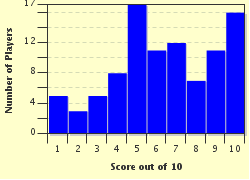Quiz Answer Key and Fun Facts
1. Most of us know that "ford" means a river crossing, but what does the "Bed" in Bedford mean?
2. This one looks easy, but looks deceive. What does Dulwich mean?
3. Not to be confused with the neighbouring borough of Kensington, what does Kennington mean?
4. You'd be right in thinking "field" (from German "feld") means exactly what we expect it to, but what does "Lind" mean in Lindfield?
5. This place was used as the location for the television series Midsomer Murders. We should all be able to figure out that "ley" means "lea", but what does the "Chears" mean in Chearsley?
6. The "lake" in Mortlake appears to be self-explanatory, but it could be a misspelling of something else, and "Mort" may not be what you think it is either! Which of these is NOT a possible source for the suburb of Mortlake?
7. This town sounds like a solid, strong and strapping place, but what do you think Stroud really means?
8. The "bridge" in Trowbridge is self-explanatory, but what does "Trow" mean?
9. Now this is a place name with many possibilities. What does Weedon mean?
10. Famous for its sauce, what do you think Worcester means?
Source: Author
dramatica
This quiz was reviewed by FunTrivia editor
Tizzabelle before going online.
Any errors found in FunTrivia content are routinely corrected through our feedback system.

